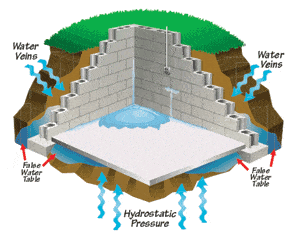Concrete is Porous: Here’s What that Means for your Basement
Have you ever been in a basement and noticed an underlying musty smell and felt a bit of humidity? 
You were smelling and feeling that because of the moisture that made its way into the concrete that makes up the foundation of the house.
But, before we get into how to avoid a damp basement, let’s talk about how this happens in the first place.
Let’s start from the top and talk about the concrete around your basement. It’s a building material that’s made from a mix of stone or gravel, sand, cement and water. This mixture can then be spread or poured into molds to build structures.
Concrete is used to build everything from driveways to highways and buildings to home foundations.
This is by no means earth-shattering news as concrete in some way, shape, or form has been around for millions of years.
But, it’s worth noting because it’s the basis of this blog post and understanding the general make-up of concrete will help you understand the issues that can arise in a person’s basement or cellar.
Now that we’ve nailed down what concrete is made of, it’s time to address the porosity of concrete.
In fact, did you know that concrete is more porous than swiss cheese?
Why does this fun fact matter? It matters because it brings us full-circle to the start of this blog when we talked about a humid, musty-smelling basement.
The culprit in that scenario lies in the fact that the concrete that makes up your foundation is porous which means water can easily penetrate it. Concrete is not at all waterproof and is more of an absorbent material with millions of microscopic canals for water to flow through.
When the pores of the concrete gets wet, the water is able to make its way into the other side, and moisture begins to seep into the basement.
Eventually, the water will break down the concrete causing cracks and leaks which expedites the process and leads to moisture, mold, and mildew.
I think we can all agree that this is a problem and with every problem comes a solution.
The solution in this case is a mix of due diligence and action:
Due diligence requires you to keep tabs on your basement. From crawlspaces to closets to walls and floors, you’ll want to make sure that there are no signs of cracks, leaks, or moisture. When you spot something, it’s time to do something.
Contact us today to learn more.

